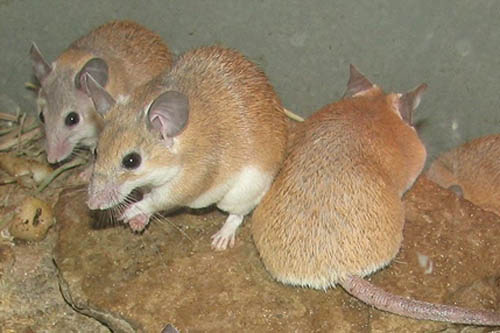ALMOST 1,000 animals per week were used for breeding and research at a Scottish university last year.
Dundee University revealed that more than 47,313 animals were used in “regulated procedures” in 2011.
The animal tests were carried out by the college of life sciences and the college of medicine, dentistry and nursing in the aid of research.
In a freedom of information request, it was revealed that 25,894 mice were used for breeding, as well as 1000 rats, 166 frogs, and 41 rabbits.
In the response, the university said: “The remaining animals were used for fundamental biological research or studies applied to medicine.”
Over 13,000 are held on campus but the numbers can vary, according to the response.
But the university were adamant that such experiments are vital for the discovery of new medicines.
It quoted its written policy on animal testing and insists that other testing methods are used where possible.
The statement said: “Many of the important discoveries made in these programmes have depended crucially on the use of experimental animals.
“The university also takes its ethical and legal responsibilities very seriously.
“Alternatives to the use of living animals for example computer models and increasingly sophisticated cell culture systems, are adopted whenever possible, but procedures that involve animals continue to be necessary in many cases, particularly when the integrated behaviour of complex physiological systems is being studied.”
“The results of these studies are of great importance in understanding and thereby potentially being able to treat or prevent serious health problems including cancer, heart disease, diabetes, genetic disorders and infectious diseases.
“Nevertheless, it is very important that these potential benefits to human and, indeed, animal health can be seen to outweigh the welfare costs experienced by experimental animals,” the university said.
Benefit and cost analysis is carried out by an ethical review committee before any project gets the green light.
Staff working with the animals are also trained to house the animals properly.
Ethical review
Procedures that involve the use of animals require the approval of the ethical review committee.
The majority of such procedures must also be licensed by the Home Office under the Animals (Scientific Procedures) Act 1986.
The university said: “Compliance with the provisions of the law is monitored closely by the university and, indeed, by the local Home Office inspector, who makes regular unannounced visits.”
Dr Katy Taylor from the British Union for the Abolition of Vivisection said: ‘The BUAV is shocked to learn of the large number of animals used by Dundee University.
“While finding cures for human illnesses is laudable, animal research is not only cruel, it is also a failure.
“AIDS vaccines, diabetic treatments as well as treatments for stroke, Alzheimer’s, Parkinson’s, cancer and many more diseases – have worked in mice and even monkeys, yet failed in humans.
“Animals cannot predict if a new treatment will be safe in people. There is an urgent need to move away from using animals to superior and humane tests using human cells and tissues.’”
The cost to the university of the animal research will be enormous, said BUAV.
Researchers, depending on the human disease or disorder they want to study, have to buy mice and other animals from commercial providers with the relevant defect “bred in”.
Two pairs of mice suffering with epilepsy, for example, could cost £1,220.
And if the university were to order a mouse with a specific genetic modification, it could could set them back up to £61,000 according to their estimates.
Karen Gardiner, spokeswoman for the Institute of Animal Technology said: “The biomedical research community have nothing to apologise for. The work that we do is really important and there is no-one alive in this country who hasn’t benefited from these tests.
“Dundee University is very prestigious and carry out very important experiments on Alzheimer’s, allergies, asthma, and neuroscience.”
She added that not all of the experimental work involved invasive work, such as surgery.
“They do a lot of important procedures which can involve giving blood, a change of diet or breeding. A lot of the time animals won’t even know what’s being done to them,” she said.


